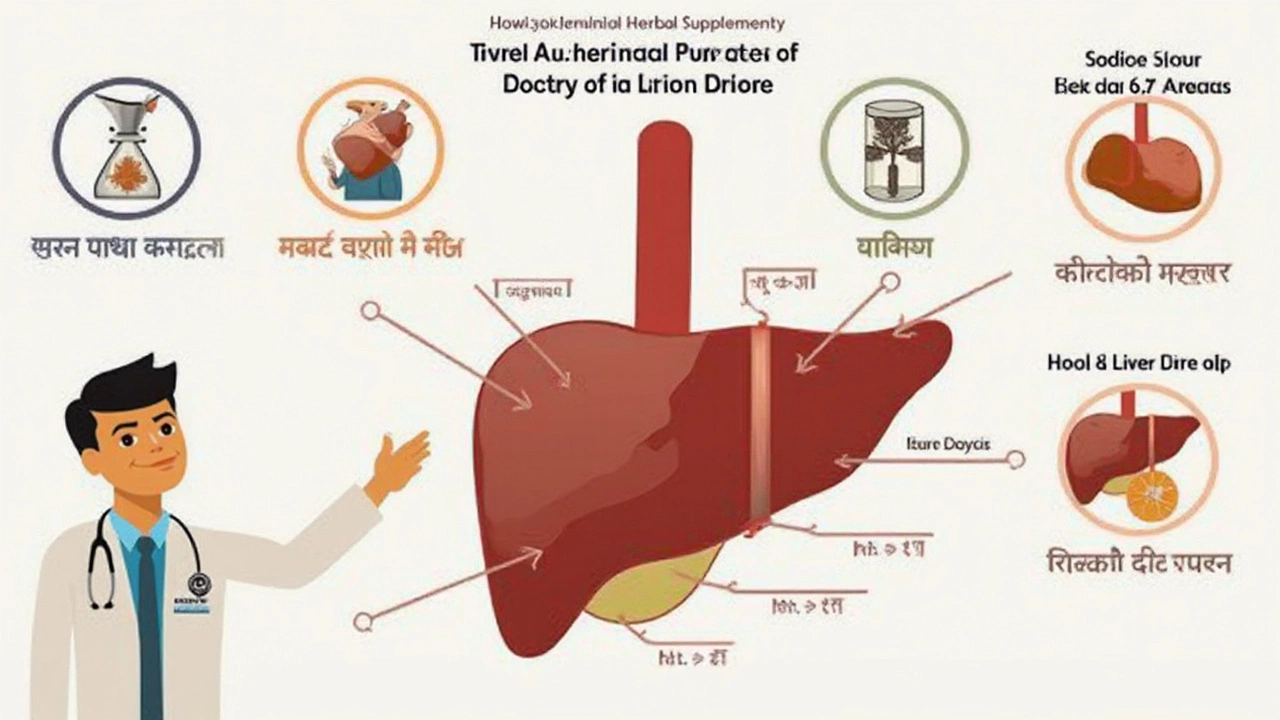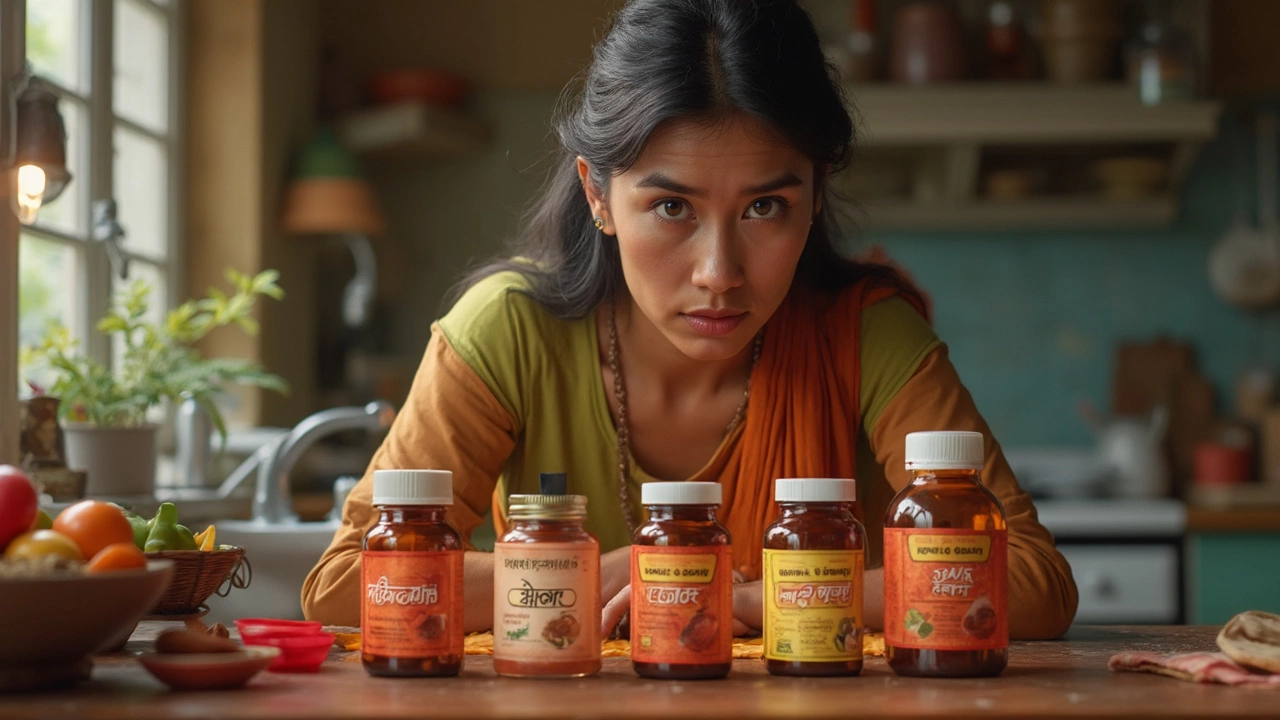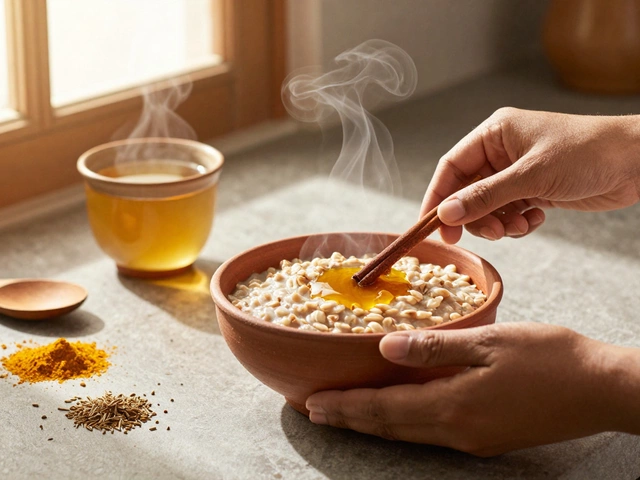Think all herbal supplements are harmless? Plenty of people fall for that trap. But some of these so-called “natural” remedies can push your liver to the edge, with side effects scarier than you’d expect. Your liver is basically the body's bouncer, handling toxins and keeping you safe, but even it has limits.
There's a crazy twist: the same capsules you pick up from a health shop—promised to make you feel better—might do the opposite. The worst part? Trouble often builds up slowly, with warning signs like fatigue or yellowing skin only showing up after the damage is done.
If you take supplements or know someone who does, it pays to learn which herbal picks are enemy number one for your liver. Let’s go straight to what you need to know, no sugar-coating, so you can steer clear of these hidden dangers and keep your liver safe.
- When Healthy Herbs Turn Toxic
- The Big Three: Herbal Culprits for Liver Damage
- Real Stories and Warning Signs
- Safer Supplement Smarts
When Healthy Herbs Turn Toxic
Herbal supplements are everywhere now, lining store shelves with the promise of an easy health boost. They show up in gym bags, wellness blogs, and medicine cabinets across the world. Here’s where things get tricky: just because something is labeled “herbal” or “natural” doesn’t mean your liver is safe. The liver health risks are real—and in some countries, herbal supplements are a leading cause of liver injury after alcohol and prescription medicines.
The problem is that many people think herbs are basically plants, so they’re automatically gentle. Not true. Some herbs can get downright nasty inside your body, producing toxic byproducts that the liver has to break down. Over time, or even after just one heavy dose, this can lead to liver swelling, scarring, or even failure. The catch? A lot of these supplements aren’t tested like medicines; most aren’t even regulated closely in the US or India. So, you’re often taking a gamble with every capsule.
Check out what real-world numbers look like. In the US, a 2021 study found that about 20% of drug-related liver injuries came from herbal and dietary supplements. Here’s how that stacks up in a simple table:
| Country | % of Liver Injuries From Herbal Supplements | Most Common Offenders |
|---|---|---|
| USA | 20% | Green tea extract, kava, anabolic steroids |
| India | 25% | Ayurvedic herbs, ashwagandha, turmeric |
| China | 15% | Traditional Chinese herbs |
An important tip: if an herbal supplement’s label doesn’t clearly list the active ingredients or warns you not to use it long-term, that’s a red flag. Also, watch for blends that mix multiple herbs together—you never know which combo might tip your liver over the edge. When in doubt, stick with products that have been independently tested or that your doctor actually recommends. Don’t trust fancy packaging or bold claims online.
The Big Three: Herbal Culprits for Liver Damage
Out of all the herbal supplements out there, three stand out as the worst for your liver. These aren’t just rumors—there have been real studies, plenty of medical case reports, and some scary firsthand stories. Let’s break it down so you know exactly what to watch out for.
- Kava: This one pops up everywhere as a stress-buster or sleep aid, and truthfully, it's had a major comeback online. Problem: kava's linked directly to liver failure, hepatitis, and even cases where people needed liver transplants. The risk seems highest if you take high doses or use it long-term, but even short-term use has ended badly for some folks. Germany, the UK, and Canada have all pulled kava from shelves before because of these dangers.
- Green Tea Extract: You’ve probably seen this in fat-burner pills or “detox” products. In its normal tea form, green tea’s fine. But when it’s concentrated down into a supplement, that’s where issues start. According to some liver specialists, green tea extract is one of the top herbal causes of liver problems worldwide. In one review published in "Hepatology," over a hundred cases of liver injury tied back to green tea extract, especially involving fat-burning supplements.
- Black Cohosh: Often sold for menopause symptoms, this herb is easy to find and sounds harmless. But hospitals have reported black cohosh causing hepatitis and even acute liver failure—sometimes after just a few weeks. The FDA gets regular reports on black cohosh and liver damage, but you still see it pushed in “natural” menopause remedies everywhere.
Here’s how bad it can get, on a bigger scale:
| Herbal Supplement | Reported Liver Injury Cases in US (last 10 years) |
|---|---|
| Kava | Over 50 |
| Green Tea Extract | 120+ |
| Black Cohosh | At least 60 |
One reason these supplements are so tricky is that liver symptoms often look like nothing at first—just some mild stomach upset, tiredness, or dark urine. But once real damage starts, it moves fast. None of these herbs are guaranteed to hurt everyone, but if you’re already taking other meds or have liver problems, your risk is way higher.
If you really want to protect your liver health, the best move is simple: skip these three herbs altogether. Look for safer alternatives with a proven track record, and always let your doctor know what you’re taking—even if it says "natural" on the bottle.

Real Stories and Warning Signs
Doctors keep seeing people come in thinking their tiredness or yellowing eyes means they’re just stressed out. Turns out, some of these folks have been taking herbal supplements, believing they’re helping their bodies. Real cases have popped up all over the world where supplements like kava, green tea extract, and black cohosh have messed up people’s livers—and some ended up in the ER or needed a liver transplant.
For example, there was a healthy 28-year-old woman who started feeling exhausted and noticed her skin turning yellow after using a “liver detox” herbal pill. Blood tests showed serious liver stress, and doctors blamed her supplement. In another case, an athlete using green tea extract to lose weight landed in the hospital with sky-high liver enzymes and jaundice. It’s not just rare—hundreds of reports now link these specific herbal products to liver health problems.
If you spot these warning signs after starting an herbal supplement, your liver might be in trouble:
- Yellow or itchy skin
- Dark urine
- Extreme tiredness for no reason
- Loss of appetite
- Pain or swelling on the upper right side of your belly
Don’t shrug these off, especially if you’ve just started a new supplement. If you see any of these signs, stop the supplement and check in with your doctor—sooner is better.
Here’s a quick look at how common some of these liver supplement problems have been in the last few years:
| Supplement Type | Known Liver Injury Cases (2020-2024) | Common Symptoms Noted |
|---|---|---|
| Kava | 90+ | Severe fatigue, jaundice |
| Green Tea Extract | 120+ | Nausea, dark urine |
| Black Cohosh | 80+ | Appetite loss, yellow skin |
What’s the takeaway? Even the so-called “natural” stuff can hit your liver hard. Stay alert, listen to your body, and don’t be afraid to speak up if you notice anything off while taking herbal supplements.
Safer Supplement Smarts
It’s easy to get overwhelmed by the rows of bottles at the pharmacy, with promises like “liver detox” and “all-natural cure.” Don’t fall for everything you read on a label. Here’s the truth: supplements in the US don’t go through the same testing as actual medicines. The FDA doesn’t check them for safety before they land on shelves, which means you need to be extra careful—especially when it comes to your liver.
To protect your liver health, you’ve got to keep a skeptical eye. Ask your doctor or a licensed pharmacist before adding any supplement to your daily routine, especially if you’re already taking other medicines. Herbal products can mess with prescription drugs, and the results won’t be pretty.
“Just because it’s natural doesn’t mean it’s safe. Liver toxicity from supplements is a growing problem, and we see it every week in the clinic.” — Dr. Victor Navarro, hepatologist at Einstein Healthcare Network
It’s not just about what’s in the bottle, but how much you use. High doses or long-term use of certain herbs—like green tea extract or kava—can do a number on your liver. Watch for combo products too; sometimes multiple harmful herbs are mixed together, making things even riskier.
Here’s a quick guide to smarter supplement shopping:
- Always check for third-party seals (like USP or NSF) for a better shot at product purity.
- Stick to the recommended dosage, or less. More is not always better.
- If you notice any symptoms like yellowing eyes, dark urine, or fatigue after starting something new, stop right away and call your doctor.
- Stay wary of miracle claims or brands you’ve never heard of. If it sounds too good to be true, it probably is.
Here’s a snapshot of liver injuries caused by common supplements in the U.S.:
| Herbal Supplement | Percent of U.S. Liver Injury Cases Linked |
|---|---|
| Green Tea Extract | 20% |
| Kava | 7% |
| Black Cohosh | 5% |
At the end of the day, you don’t have to ditch supplements completely—just be smart about what you're putting in your body. Get advice from someone who actually knows what’s safe, not just what’s trendy. Your liver will thank you for it.





